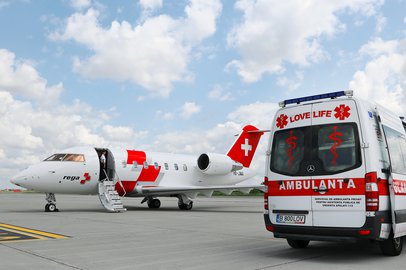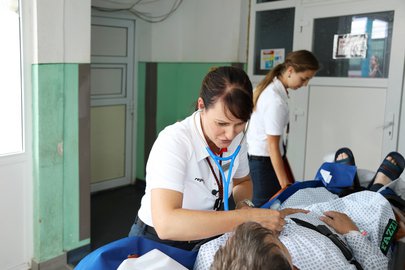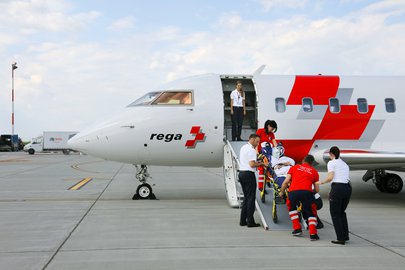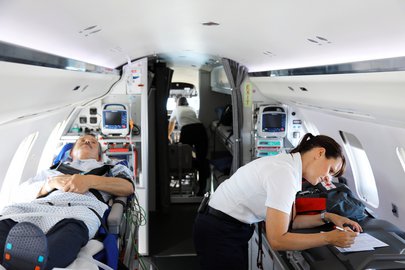"It happened when I tried to avoid a run-over badger," relates Robert Gisi. His motorbike swerves off the asphalt road onto the sandy ground of the hard shoulder. The 63-year-old man from Solothurn flies over the handlebars, the landing is painful. Robert Gisi breaks nine of the twelve ribs on his right side. Fortunately a local man witnesses the accident. He stops his car, calls the Romanian ambulance and waits until it arrives on the scene. Robert Gisi is driven to hospital with the blue light flashing. He has to wait for many hours in the A&E ward, lying on a stretcher, before he is examined. Finally the doctors x-ray him and give him painkillers and antibiotics. Then Robert Gisi is put into a room with five other patients.
Clarifications by the Rega medical consultant
From his hospital bed, Robert Gisi calls his girlfriend in Switzerland. She immediately contacts Rega. The flight coordinator answers the call at the Operations Centre in Zurich and asks for the patient’s name and diagnosis, as well as details of the hospital. Shortly afterwards, a Rega medical consultant contacts Robert Gisi, and subsequently discusses the patient’s condition and the further measures with the doctor in attendance at the Romanian hospital. The objective of this remote medical assessment is to obtain an as accurate picture as possible of the patient’s state of health and the situation regarding the medical care on location. Based on the information provided, the Rega medical consultant decides that Gisi should be flown to Zurich by ambulance jet the next day. The flight coordinator immediately sets about making all the necessary arrangements: they draw up a time schedule, mobilise the crews, arrange for a local ambulance to transport the patient to the airport, and inform the hospital, the patient’s relatives and the Rega dispatcher. The dispatcher then, among other things, calculates the flight route, checks the weather and wind conditions, obtains permits and prepares all the necessary documents for the flight. Meanwhile, the flight coordinator informs Gisi by telephone about his forthcoming repatriation.
Long journey by ambulance
The following day, after an almost two-hour flight, the Rega ambulance jet lands in Craiova. Although this is the nearest airport, the journey from there to the hospital still takes another two hours. The ambulance takes the medical crew – that is, intensive care nurse Carola Schmid and flight physician Nadine Nieuwkamp – to the hospital. The high-speed journey leads past small villages, huge sunflower and maize fields, scattered settlements with colourful houses, horses and stray dogs. When the crew finally arrive at the hospital, Robert Gisi is delighted. "It’s fantastic that you’re here, I’m so pleased to see you," he tells flight physician Nadine Nieuwkamp.
Medically well cared for
In the hospital corridor, the Rega crew meets the Romanian doctor in attendance. He tells the Rega flight physician what medication Robert Gisi was given that morning and everything that his team had done over the last three days to help the patient. Robert Gisi’s inner chest wall had been injured due to the broken ribs. Therefore air and blood had entered the space between the lung and the chest wall. "This can cause the lung to partially or fully collapse. In medical terms, this is known as pneumothorax," explains Nadine Nieuwkamp. In order for the blood to drain out of the space and for the lungs to expand again, the Romanian physicians have inserted a chest drain. This allows the lung to inflate so that the patient can breathe properly again. "The existing drainage was faultless, so we didn’t have to insert a new one," says Nieuwkamp. "After a brief examination, we were able to give Mr Gisi painkillers, load him into the ambulance, and drive him to the airport." During the flight, Robert Gisi thanks the medical crew several times: "When Rega called, I knew that everything would be OK. I’m so grateful that I can fly home with you."
Professional care in the ambulance jet
On the flight back home, intensive care nurse Carola Schmid and flight physician Nadine Nieuwkamp take care of the patient. "Close monitoring of the vital functions is essential in order to be able to respond as quickly as possible. Throughout the journey, we checked the oxygen saturation in the blood, the blood pressure, the heart rate and the chest drain. In addition, we administered medication to relieve the severe pain," explains the Rega flight physician.
"We monitor the patient's vital functions throughout the entire repatriation, so that we can respond quickly in an emergency"
Nadine Nieuwkamp
flight physician
Shortly after takeoff, Robert Gisi dozes off briefly. When he wakes up, he is allowed to eat a small meal and he starts to talk about what happened. "The Romanian doctors did everything they could to help me. But the standard of medical care is not comparable to that in Switzerland."
Different countries, different customs
Not only the medical equipment is different, but the medical care, too. "The task of the nursing staff is mainly limited to administering medication," recounts Robert Gisi. "If one of us had to get out of bed, the other patients assisted him. We helped each other wherever possible." Furthermore, no meals are served. Each patient has to organise their food themselves – a real challenge if you do not speak the local language and do not know anyone. But Robert Gisi is lucky: his food is brought to him by the Romanian who had observed the accident and called the ambulance. "Cornel visited me every day and helped me wherever he could," says Robert Gisi. His helper also offers to look after Gisi’s motorbike until it is transported back to Switzerland with the assistance of his insurance company. "I was very moved by the incredible helpfulness and friendliness of the local people and the patients in the hospital. That’s something I will never forget," says Robert Gisi. "For this reason, I’m planning to repeat my trip some time in the future. But then I will definitely not travel alone."
Karin Zahner




